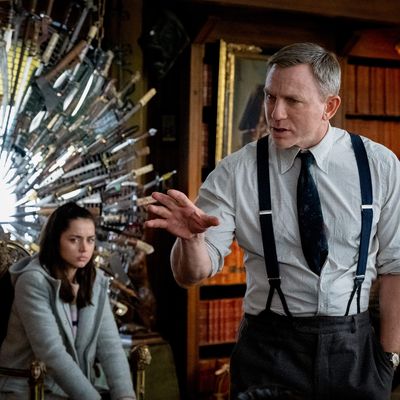
The cigar-puffing, tweed-clad nucleus around which Knives Out’s sprawling, ensemble cast orbits, Daniel Craig portrays Benoit Blanc, a private detective facing a pileup of circumstantial evidence and family rivalries that may have somehow factored into the suicide — or is it murder? — of a wealthy mystery novelist named Harlan Thrombey. But even as the blockbuster whodunit’s red herrings align toward a shocking reveal, Blanc remains a mystery wrapped inside an enigma in his own right. By locution and disposition, we know he’s a Southerner, and his professional efficacy is established by a fictional New Yorker article, “The Last of the Gentleman Sleuths.” But aside from those details, Knives Out provides Blanc with just a single crumb of backstory: Early on, caretaker Marta (Ana de Armas) asks Blanc if he knew Harlan prior to his death. Blanc replies no, but it turns out the novelist maintained a professional acquaintance with Blanc’s father, a police detective.
To hear it from writer-director Rian Johnson — who absorbed a Death Star’s worth of fan vitriol for helming Star Wars: The Last Jedi and received a Best Original Screenplay nomination for Knives Out — the absence of insight into Craig’s character was a deliberate omission. “Getting little tantalizing details are fun,” Johnson explains. “But sometimes there’s a tendency to mistake backstory for character. Ultimately, it’s not that interesting. Especially with a murder-mystery, where you have a large number of suspects and only two hours to solve it. Real estate becomes incredibly precious.”
“So the notion of taking even a few lines of dialogue for him to talk about where he grew up?” he adds. “I mean, who cares?”
Since its November theatrical release, Knives Out has exceeded all financial expectations, grossing more than more than $300 million worldwide, boosting revenues and operating income for its studio distributor, Lionsgate, above Wall Street projections for 2019’s third fiscal quarter. With the $40 million movie’s extras-packed DVD hitting retail February 25 and recent news proclaiming that Lionsgate has green-lighted a sequel, it’s fair to wonder: Will we finally get Benoit’s backstory?
After The Hollywood Reporter wrote that Johnson is “developing a sequel centered on Daniel Craig’s Southern detective Benoit Blanc investigating a new case,” fans have begun speculating whether the sequel — the second in a presumed franchise, if things turn out right — will function as a kind of prequel, Young Indiana Jones-ing the Blanc character’s origins and fleshing out his personal history. (The Thrombey case is definitively closed at the conclusion of Knives Out.)
But Johnson, who first conceived the character more than a decade ago, is quick to dismiss the notion that any new film will delve too deeply into Blanc’s creation myth, likening the character’s next iteration to the way British mystery doyenne Agatha Christie plotted multiple novels around Belgian supersleuth Hercule Poirot without ever filling in her protagonist’s personal particulars. “This’ll be another Poirot novel. This’ll be just like what Agatha Christie did,” Johnson says. “It’s disconnected from Knives Out. It’s just another case.”
When I ask how far along the sequel’s script is at this point, the filmmaker laughs. “Not far enough, is the perpetual answer. I’m in the middle of it right now. Just kind of … I don’t know … working on it.”
Of course the Continuing Adventures of Benoit Blanc would be nearly impossible to sustain without the complicity of Craig, whose notorious recalcitrance toward movie stardom compelled the British actor to say in 2015, “I’d rather slash my wrists” than reprise his most famous role as James Bond in contractually obligated sequels. According to Johnson, Craig relished his experience filming Knives Out, drawing a parallel with Peter Ustinov’s droll yet cunning performances as Christie’s most famous investigator in such ’80s movies as Evil Under the Sun and Appointment With Death. “Daniel found what was funny,” says Johnson. “He found humor in the part and dug into it and genuinely had fun playing it. It’s something that goes back to how Christie uses Poirot. He’s smart and formidable, but there’s something slightly clownish about him. Ustinov keyed into the way the character was kind of self-inflated, and Daniel found that element in Blanc and really had fun with it.”
Exhibit A: Blanc’s infamous donut soliloquy in Knives Out. “I spoke in the car about the hole in the center of this donut. And, yes, what you and Harlan did that fateful night seems at first glance to fill that hole perfectly,” the investigator says in a penultimate scene, just before finally fingering the murder’s true culprit. “A donut hole in the donut’s hole. But we must look a little closer. And when we do, we see the donut hole has a hole in its center — it is not a donut hole at all but a smaller donut with its own hole. And our donut is not a hole at all!”
Turns out that despite the absolute surety of Craig’s delivery of the material, neither he nor the writer-director are exactly sure what Blanc is talking about in the scene. “A lot of stuff in Knives Out came from me loving the tropes of whodunits. The detective laying it all out in the library at the end: that’s just a scene that I love, that I wanted to be in the movie,” says Johnson. “You have the detective giving some kind of essentially nonsensical metaphor for how he does what he does. It really makes no sense, but it sounds good!”
“And so the idea of doing that and really seeing how far we could push it in terms of the ridiculousness of the metaphor,” he continues. “That was something that was just too fun to pass up.” Kind of like a Knives Out sequel.


